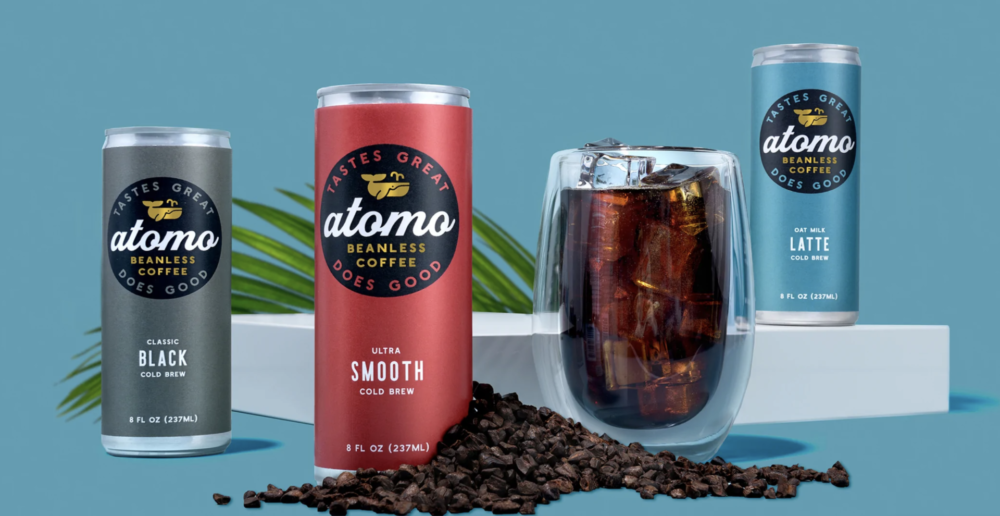[Disclosure: AgFunder is AFN’s parent company.]
- Foodtech startup Atomo has closed a $40 million Series A round and officially launched the first of its “beanless” molecular coffee products to consumers.
- AgFunder, S2G Ventures and Horizon Ventures, all previous investors in the company, participated in the round.
- Atomo will use the Series A funds to develop new beanless coffee products, scale its manufacturing capabilities, and launch more products to consumers.
On background:
Founded in 2019, Seattle-based Atomo uses a blend of upcycled plant ingredients to recreate the taste of coffee without any actual coffee beans, delivering a drink with a lower environmental footprint in the process.
- The beverage is made from upcycled date seeds soaked in a proprietary blend of ingredients, though some details of this patent-pending process are not yet public, Atomo’s head of growth Ed Hoehn told AFN.
- Those in need of a morning pick-me-up are in luck: Atomo says its beverages still deliver “the caffeine consumers expect.”
- Atomo claims its beanless coffee produces 93% less carbon emissions and uses 94% less water than traditional coffee.
- The startup just launched its first two beverages, both ready-to-drink cold brews: Classic Black and Ultra Smooth. Products are available direct-to-consumer via the Atomo website.
Why it matters:
Coffee is one of the world’s most widely consumed beverages and an important commodity in trade. It’s also a rather problematic one, given that it contributes to climate change while simultaneously absorbing the impacts of it.
- Coffee is an extremely water-intensive process, with about 39 gallons needed to produce one cup, according to UNESCO’s Institute for Water Education.
- Producing, transporting, and even brewing coffee are all energy-intensive processes that can contribute to greenhouse gas emissions and deforestation.
- The Inter-American Development Bank estimates that rising temperatures will reduce the area suitable for growing coffee by up to 50% by 2050. This would impact producers in Latin American countries like Brazil and Colombia as well as Vietnam, Indonesia, and parts of Ethiopia.
Ideas for creating more sustainable coffee run the gamut, from breeding new strains of beans, to growing them in the lab – through to processes like Atomo’s that remove the bean entirely. Another company, Compound Foods, also develops a beanless version of the drink by replicating microbes from coffee cherries in bioreactors.
“The demand for coffee is increasing year over year, with climate change significantly impacting the farming regions, which in turn will impact the consumer through price and availability,” AgFunder founder Rob Leclerc said in a statement.
“Breakthrough technologies pioneered by Atomo are going to be a part of the solution for future generations to be able continue enjoying their favorite brews.”
How Atomo will use the funds:
Hoehn tells AFN that the Series A round is “all about manufacturing scale and really allowing us to grow our ability to meet consumer demand.”
- Atomo is building a new manufacturing facility in Indio, California, and is investing in its existing Seattle site as well.
- Hoehn says the Series A round has given Atomo the ability to launch in retail, which the company plans to do by Q4 2022.
- Funding will go towards development of new products, which could include hot coffee at some point, according to Hoehn. Recreating hot coffee is a “fairly challenging” process that Atomo is “pretty close on,” he said.
- “While we did start with a cold brew product, fast on the heels of that we’re focusing on grounds, pods, and other opportunities to really delight consumers and give them opportunity to taste our product or enjoy our products like they used enjoy regular coffee,” he said.
- In a recent blind taste study conducted by National Food Lab, Atomo’s cold brew had a 2:1 margin on preference over conventional cold brew products from major coffee companies. According to the startup, panelists could not tell that its product was made without conventional coffee beans.





